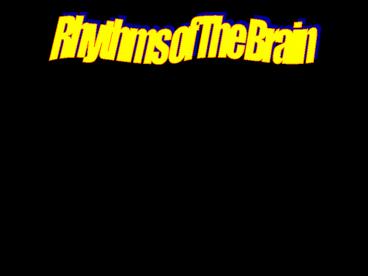Rhythms of The Brain PowerPoint PPT Presentation
1 / 29
Title: Rhythms of The Brain
1
Rhythms of The Brain
2
Biological Rhythms
- Circannual - year
- Circadian - daily
- Biological Clocks time our rhythms
3
Human Circadian Rhythm
6 months in a cave!
4
Actual vs. Endogenous Rhythm
endogenous
Without natural cues, sleep-wake cycles around a
25 hr day Environmental cues (zeitgebers) resynch
ronize internal clock to a 24-hr day.
5
What IS The Clock?
6
Suprachiasmatic Nucleus (SCN) of the hypothalamus
- Retinohypothalamic - path from retina to SCN
- Lesion - behaviors continue but at inappropriate
times - Intrinsic rhythmicity
- Cut input/outputs
- Individual neurons show rhythm in a dish
- Induce rhythm when transplanted (lesioned, normal)
7
SCN CONTROLS PINEAL GLAND WHICH PRODUCES
MELATONINMELATONIN can make you sleepybut
sleep is not dependent on it
8
Sleep Physiology
- EEG Electroencephalography
9
EEG Patterns During Different States
10
Sleep Stages(EEG)
REM Rapid Eye Movement Paradoxical Sleep
11
Cycling Sleep Stages
Multiple Cycles each night REM lengthens
12
NREM Sleep
- Walking, talking screaming in your sleep
- Night terrors
- Age 5-7 years
- Feeling of uncontrollable panic, accompanied by
increased heart rate, blood pressure
13
REM Dreaming
- Eyes move, toes, fingers, mouths twitch
- Everyone dreams.why?
- Activation-synthesis hypothesis
- Random activation of cortex by brainstem. Cortex
generates images, actions emotions from memory
stores - Evolutionary hypothesis
- Lead to enhanced performance in dealing w/
threatening life events
14
Do We Need Sleep?
- Spend 1/3 of life
- Highly conserved
15
Total deprivation in some animals death
16
Human Deprivation
- A debt is created
- Psychosis
- Irritability
- Difficulty concentrating
- Disorientation
- Memory impairment
Randy Gardner (1963), 17 yrs old, 11 days w/out
sleep Irritable, nausea, memory problems, mild
delusions, tremors Speech slurred, no EEG alpha
waves. When he slept 15 hrs Butno lasting
harmful effects
17
Response to Sleep Deprivation
Fall asleep quickly
- Sleep Rebound
- Increased intensity, duration
- REM and slow wave sleep
18
Why Do We Need Sleep?
- Biological Adaptation
- Energy conservation predator/prey keeps us
quiet when we cant move around well - Restoration
- NREM - free radical repair
- REM - reset monamine sensitivity
- Memory
- Rats and humans replay events in their sleep
19
(No Transcript)
20
Neural Basis of Sleep
- Reticular Formation
- maintains cortical arousal waking EEG
- turns NREM on and off
21
- Sensory input activates RAS which desynchronizes
cortical EEG - Destroy RAS - coma, Karen Ann Quinlan
22
Neural Basis of REM
- Damage - disrupts REM
- Projections to cortex motor areas of medulla
events related to REM - muscle paralysis
- Waking EEG
Initiates REM
Produces REM activities
23
Lesions to descending makes a Sleep -Walking Cat
24
Sleep Disorders
- Sleep apnea
- Narcolepsy
25
Sleep Apnea
- Apnea want of breath
- Central (brainstem)
- Obstructive
- Chronically tired, often not aware of the
episodes, high blood pressure - Treatment - many surgery to life style changes
26
Snoring
Apnea
Nasal Continuous Positive Airway Pressure (CPAP)
27
(No Transcript)
28
Narcolepsy
- Main Symptoms
- Excessive daytime sleepiness
- Cataplexy - sudden loss of voluntary muscle
control (usually triggered by emotions) person is
alert - Sleep paralysis during transition from sleep to
waking - Hypnogogic hallucinations - REM sleep while
conscious
It is an abnormal intrusion of the
characteristics of REM sleep into waking.
29
What Causes it?
- Degeneration or absence of hypothalamus cells
producing hypocretin (aka orexin) peptide
essential to the human sleep-wake cycle
(autoimmune?). - Hypocretin knockout mice narcoleptic
- Result- disruption of RAF nuclei which control
various aspects of sleep - TREATMENT
- frequent naps, stimulants (Ritalin), tricyclic
antidepressants (suppress REM)

